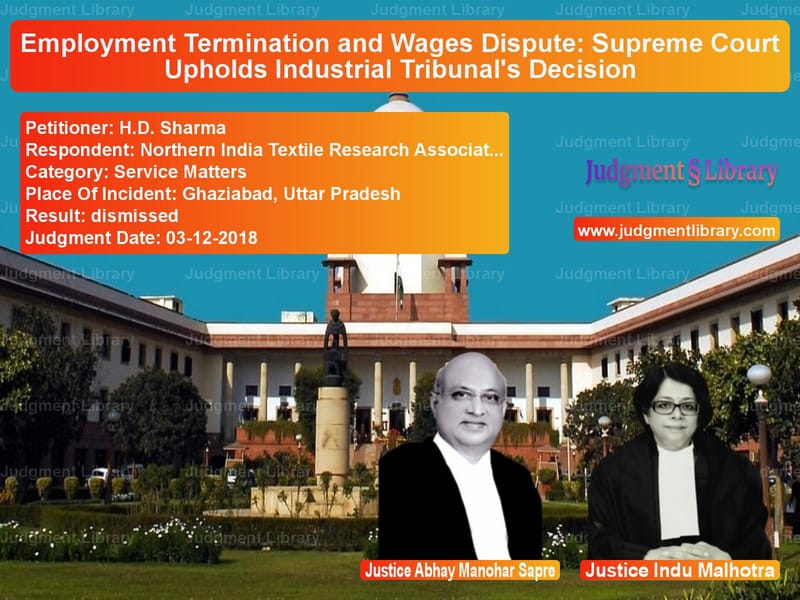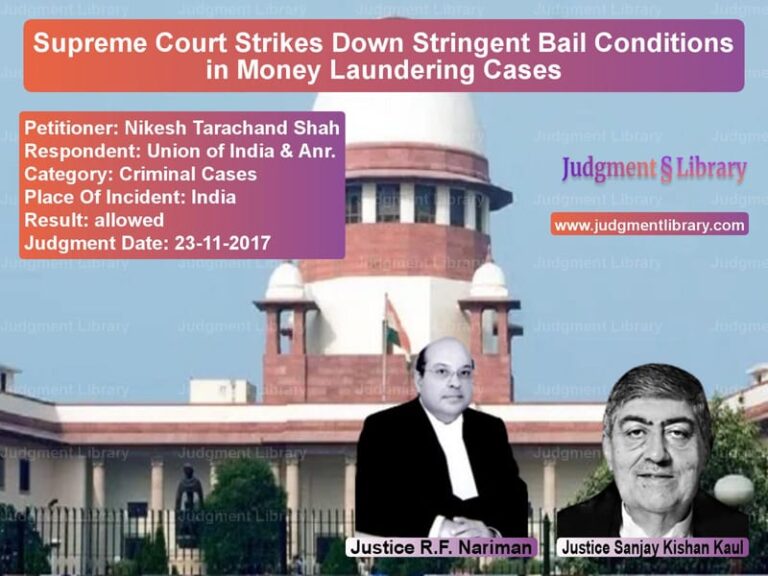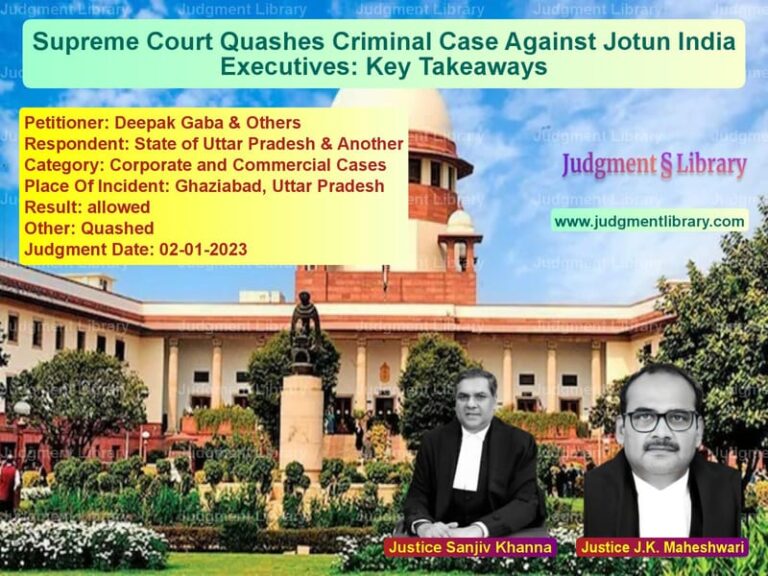Employment Termination and Wages Dispute: Supreme Court Upholds Industrial Tribunal’s Decision
The case of H.D. Sharma vs. Northern India Textile Research Association deals with a crucial employment dispute regarding termination and the legal obligations of employers in ensuring compliance with labor laws. The Supreme Court had to decide whether an employer had fulfilled its statutory obligations under the U.P. Industrial Disputes Act, 1947, particularly concerning the payment of one month’s wages before dismissal.
The appellant, an employee of the Northern India Textile Research Association, was dismissed from service following a departmental inquiry. However, he contested the dismissal on the grounds that the employer had failed to pay his full wages for one month as required by law before termination. The Industrial Tribunal ruled in favor of the employee, but the High Court reversed the decision, leading to the present appeal before the Supreme Court.
Background of the Case
The dispute began with the termination of the appellant’s services and the subsequent legal battle regarding whether the employer had complied with the law while dismissing him. The timeline of events is as follows:
- On May 26, 1978, the appellant was appointed as a Duplicating Machine Operator-cum-Clerk.
- On April 24, 1987, he was dismissed from service after being found guilty of misconduct in a departmental inquiry.
- The employer applied to the Industrial Tribunal under Section 6E(2) of the U.P. Industrial Disputes Act, seeking approval of the dismissal.
- The State Government referred the matter to the Industrial Tribunal to determine the legality of the termination.
- The Industrial Tribunal ruled in favor of the appellant, holding that the employer had not paid full one-month wages before dismissal.
- The employer challenged the Tribunal’s ruling in the High Court.
- The High Court overturned the Tribunal’s decision, stating that the employer had complied with statutory requirements.
- The employee then approached the Supreme Court.
Legal Issues Considered
The Supreme Court examined the following critical issues:
- Was the employer required to pay full one-month wages to the appellant before terminating his services under Section 6E(2) of the U.P. Industrial Disputes Act?
- Did the employer make a short payment of Rs.110, and if so, did it invalidate the dismissal?
- Was the High Court justified in setting aside the Industrial Tribunal’s decision?
Arguments by the Appellant
The appellant, represented by his legal counsel, made the following arguments:
- “The employer did not ensure full compliance with the provisions of Section 6E(2), which mandates the payment of one month’s wages before termination.”
- “A short payment of Rs.110 means that the legal requirement was not met, rendering the dismissal void.”
- “The Industrial Tribunal correctly ruled that non-payment of the full amount made the termination unlawful.”
Arguments by the Respondents
The employer contended that they had fulfilled all legal obligations. Their main points were:
- “The appellant was paid his due wages, including additional sums for leave encashment.”
- “Any minor discrepancy in payment should not invalidate the termination order.”
- “The High Court correctly ruled that the Tribunal’s decision was flawed and should be set aside.”
Supreme Court’s Observations and Judgment
The Supreme Court, comprising Abhay Manohar Sapre and Indu Malhotra, upheld the High Court’s ruling but for different reasons. The Court made the following key observations:
“Section 6E(2) of the U.P. Industrial Disputes Act requires that an employee be paid full wages for one month before termination. However, in this case, the employer made an additional payment for leave encashment, which covered any shortfall.”
The Court provided the following rationale:
- The Industrial Tribunal erred in treating the shortfall of Rs.110 as a ground to invalidate the termination.
- The employer had made an additional payment of Rs.1,618 towards leave encashment, which could be adjusted against the alleged shortfall.
- The Tribunal did not correctly interpret the statutory provisions concerning the calculation of wages.
- The High Court was right in setting aside the Tribunal’s decision, as there was no substantial non-compliance with the law.
Legal Impact of the Judgment
The Supreme Court’s ruling has significant implications:
- It clarifies that minor discrepancies in wage payments before termination do not automatically invalidate dismissals.
- It affirms that courts must consider additional payments made by the employer when evaluating compliance with labor laws.
- It reinforces that judicial intervention in employment termination cases must be based on substantial non-compliance rather than minor procedural irregularities.
Final Decision
The Supreme Court dismissed the appeal, affirming that the employer had complied with statutory requirements, and upheld the termination:
“We uphold the conclusion arrived at by the High Court but for reasons different from those stated in the impugned judgment. The appeal is accordingly dismissed.”
This ruling provides important guidance on employment termination procedures and the interpretation of wage payment requirements under labor laws.
Petitioner Name: H.D. Sharma.Respondent Name: Northern India Textile Research Association.Judgment By: Justice Abhay Manohar Sapre, Justice Indu Malhotra.Place Of Incident: Ghaziabad, Uttar Pradesh.Judgment Date: 03-12-2018.
Don’t miss out on the full details! Download the complete judgment in PDF format below and gain valuable insights instantly!
Download Judgment: H.D. Sharma vs Northern India Texti Supreme Court of India Judgment Dated 03-12-2018.pdf
Direct Downlaod Judgment: Direct downlaod this Judgment
See all petitions in Employment Disputes
See all petitions in Termination Cases
See all petitions in Public Sector Employees
See all petitions in Judgment by Abhay Manohar Sapre
See all petitions in Judgment by Indu Malhotra
See all petitions in dismissed
See all petitions in supreme court of India judgments December 2018
See all petitions in 2018 judgments
See all posts in Service Matters Category
See all allowed petitions in Service Matters Category
See all Dismissed petitions in Service Matters Category
See all partially allowed petitions in Service Matters Category







